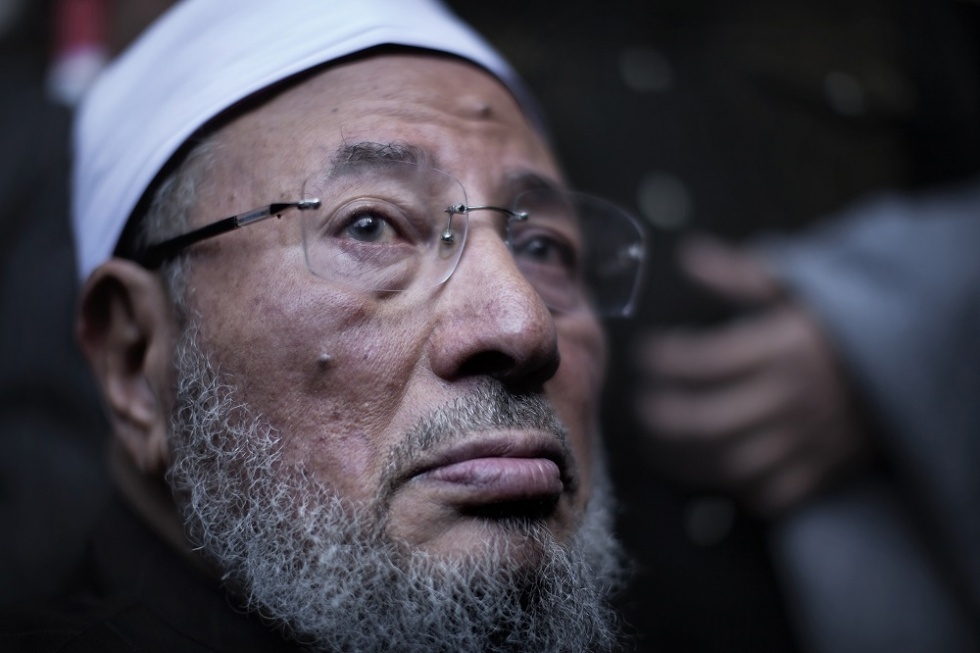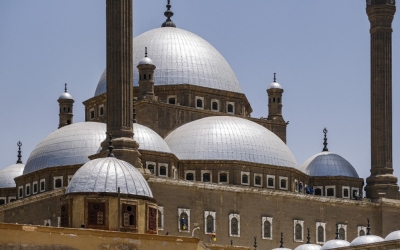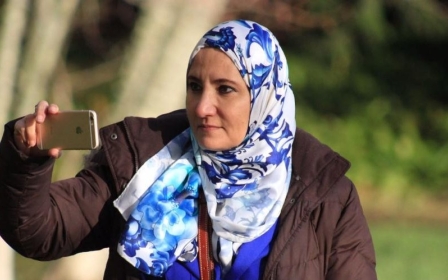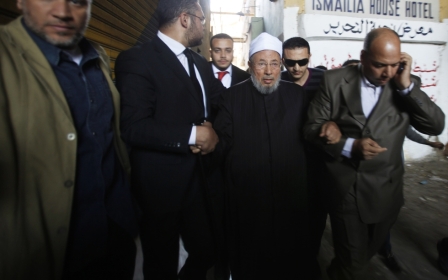Yusuf al-Qaradawi: Scholar-activist who helped inspire a revolution in Egypt

As hundreds of thousands of people gathered in Cairo's Tahrir Square for Friday prayers on 18 February 2011, an elderly cleric took to the stage to address the faithful.
"Don't let anyone steal this revolution from you – those hypocrites who will put on a new face that suits them," said Yusuf al-Qaradawi, who died in Qatar on Monday aged 96.
"The revolution isn’t over. It has just started to build Egypt - guard your revolution."
Seven days earlier, Egyptian leader Hosni Mubarak had resigned the presidency in the wake of mass protests against his decades-long administration.
By the end of the year, the Freedom and Justice Party, the political wing of the previously banned Muslim Brotherhood, had won the largest number of seats in the country's first free and fair parliamentary elections, and the FJP's Mohamed Morsi had been elected president.
New MEE newsletter: Jerusalem Dispatch
Sign up to get the latest insights and analysis on Israel-Palestine, alongside Turkey Unpacked and other MEE newsletters
As one of the most prominent ideologues associated with the Brotherhood, Qaradawi and his teachings stood at the centre of world-shaking events. He will be widely remembered as the first, and perhaps the last, global Muslim scholar-activist.
Throughout his career as a public intellectual, his approach to Islamic law - one that combined scholarship and political activism - and his ability to communicate these ideas in plain language, would earn him millions of followers.
Anti-colonial activism
Born in 1926, Qaradawi grew up in an Egypt still under British colonial rule. In his youth he combined religious education with anti-colonial activism, a combination that led to his repeated arrests at the hands of the Egyptian government.
Following Egyptian independence, his association with the Muslim Brotherhood - founded in 1928 when Qaradawi was two years old - also led to his arrest by the Arab nationalist President Gamal Abdul Nasser in the 1950s.
He eventually left Egypt for Qatar in the early 1960s, when he was appointed Dean of the Faculty of Shariah at the newly established Qatar University and granted Qatari citizenship in 1968.
While living in Qatar, he rose to fame as a scholar for his 1973 book Fiqh al-Zakat (The Jurisprudence of Zakat), which was an attempt to explain and reform the rules governing Zakat, one of the five pillars of Islam centred around compulsory alms-giving.
Qaradawi's ambition for the book was to reformulate these rules to give them greater relevance to the aspirations of contemporary Muslims by linking them to concepts of economic fairness, rather than rooting them in a rigid and ritualistic approach.
His desire to articulate new interpretations of Islamic law relevant to contemporary Muslim lives saw him pursue ad hoc methods in which he was willing to consider non-standard opinions from both within and outside of the four dominant Sunni schools of law including, most radically, Shia jurists.
Qaradawi also sought to reinterpret historical rules of Islamic law to reduce differences between Muslims and non-Muslims in order to integrate the latter more fully into modern Muslim societies.
Accordingly, he legitimated opinions that would permit non-Muslims to receive Zakat – provided they were not hostile to Muslims – even as he prohibited Zakat funds from going to nominal Muslims if they manifested belief in militantly anti-Islamic ideologies such as Marxism.
Islamic renewal
Qaradawi saw his efforts at legal interpretation and public instruction as part of a project of Islamic renewal rooted in the 19th-century reform movement known as Islamic Modernism ushered in by Jamal al-Din al-Afghani and his Egyptian student, Muhammad 'Abduh.
Legal reform was one measure considered necessary by Afghani and his followers if Muslim societies were to secure the conditions for their own independence in the face of aggressive western imperialism.
The need for practical reforms in furtherance of an overall political project of Muslim self-determination was the single most important consideration for Qaradawi throughout a long life of teaching and writing that produced hundreds of books and pamphlets, and thousands of hours of public lectures and sermons.
Qaradawi claimed that his approach to Islam was based on the middle road of moderation, or wasaṭiyya. What he seems to have understood by this was avoiding either overly restrictive understandings of Islam that would effectively prohibit anything not clearly permissible from an Islamic perspective, or licentious understandings of Islam that wished to ignore clear textual rules of the Quran using arguments grounded in the public interest or scientific or material progress.
Accordingly, while he wrote extensively against traditional limitations on the participation of women in the public sphere, and sought to restrict the scope of traditional doctrines that obliged a woman to obey her husband, he never questioned the duty of obedience as such within marriage, or that in certain circumstances a husband could resort to physical discipline against a disobedient wife.
Likewise, his approach to religious pluralism entailed an openness towards non-Muslims, but only on Islamic terms, with Qaradawi even expressing an opinion implying that non-Muslims who were not motivated by irrational hatred of Islam could also be saved in the next life.
The Law of Jihad
Consistent with these views, he engaged in fierce polemics with Salafi-Jihadist scholars and others that engaged in takfir, the practice of accusing other Muslims of apostasy, or categorically prohibited peace and friendship with non-Muslims.
In 2009 he published The Law of Jihad, an important two-volume work in which he affirmed the legitimacy of international law and the institutional structure of the United Nations against the claims of Salafi-Jihadist ideology.
His commitment to a pluralist order under an Islamic framework also led him to articulate a vision for Muslims living in democratic countries, spurring the development of a new field of applied Islamic law known as “the jurisprudence of minorities (fiqh al-aqalliyyat)”.
With other like-minded scholars, Qaradawi established the European Council for Fatwa and Research to supervise and direct these efforts.
Yet Qaradawi was also fiercely opposed to anything that smacked of religious syncretism, insisting that Muslims must always judge their affairs by what he deemed to be clear Islamic injunctions.
Moreover, if Qaradawi concluded that a foe was motivated by anti-Muslim animus, such as Zionism, communism, or later in his life, anti-Sunni animus in the case of the Syrian government, he was willing to adopt rhetoric that was both exclusionary and justified militant resistance on terms that were often inconsistent with his other writings.
His defence of Palestinian suicide bombings against Israel in the Second Intifada, although hardly limited to him, won him enduring infamy in the West, and was later used by his foes in the Arab world to accuse him of having paved the way for the adoption of this tactic by Salafi-Jihadist militant groups such as al-Qaeda, despite his consistent condemnations of their bombings and atrocities.
His overtly sectarian rhetoric during the Syrian Civil War, in which he went so far as to apologise to the Saudi religious establishment for his previous defences of Iran, suggested that he came to see the conflict as an existential one between Sunnism and Shi'ism, rather than a revolution against a dictator.
Al Jazeera audience
Qaradawi’s stature in the Muslim world, particularly in its Arabic-speaking parts, however, was not due solely to the length, nature and consistency of his efforts as a scholar and public intellectual.
He benefited greatly from the establishment of Al Jazeera, the Qatari satellite news channel that established a broad pan-Arab viewership, and for almost 15 years enjoyed a virtual monopoly of the pan-Arab television news market.
His weekly show, Ash-Shariah wal-Hayat (Islamic Law and Life), was a combination of a talk show and interactive public forum, in which Qaradawi would engage in public discussion and take live questions from callers who called in from all over the Arab world and beyond.
Qaradawi’s pre-2011 messaging was also relatively unifying at a time when there was general agreement about the greater need for inter-Arab solidarity against both US-Israeli domination and al-Qaeda-inspired Salafi-Jihadism.
But while the early days of the Arab Spring – and his sermon in Tahrir Square – represented the pinnacle of his career as a public intellectual it was a moment that proved to be short-lived.
By 2013 the Egyptian counter-revolution was under way, with Morsi imprisoned and replaced by general-turned-president Abdel Fatteh el-Sisi and the Brotherhood outlawed once more.
Qaradawi was the subject of an Interpol wanted notice – subsequently rescinded by the international policing organisation on the grounds that it was assessed to be politically motivated – and in 2018 he was sentenced in absentia to life in prison by an Egyptian military court.
With fierce ideological competition among various Arab states to control the public terms of debate about religion, it seems unlikely that Qaradawi after his death will retain his pre-2013 iconic stature.
Nor is it likely that any other current or future religious figure will be able to equal his pan-Arab status. Qaradawi’s success was in significant part a consequence of the relatively closed media environment of the pre-social media age in which Al Jazeera was the only relatively free platform available to Arabic-speaking Muslims.
Qaradawi hoped that his brand of Islamism could bring together enough Muslims and non-Muslims to secure a non-autocratic future for Arab states that was capable of resisting both Salafi-Jihadism and western and Israeli domination.
But a near-decade of regional turmoil has instead revealed deep and unresolved cleavages within Arab societies. All such illusions have been destroyed, and the path forward for the Arab world looks even darker than it did before 2011.
This article is available in French on Middle East Eye French edition.
Middle East Eye delivers independent and unrivalled coverage and analysis of the Middle East, North Africa and beyond. To learn more about republishing this content and the associated fees, please fill out this form. More about MEE can be found here.





